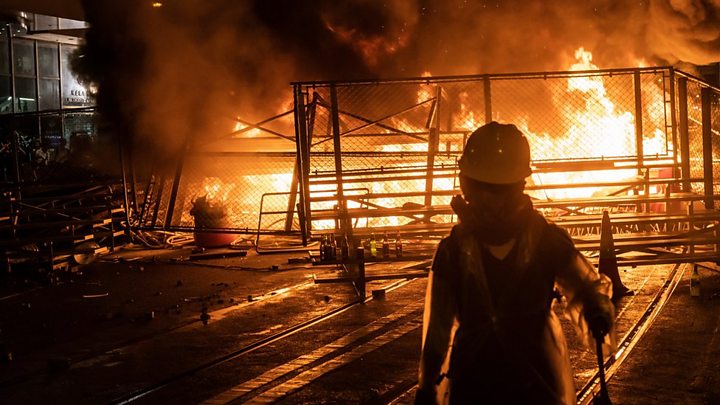China dropped a political bombshell on Hong Kong when it declared it would impose a national security law on the city. Now many fear this could spell the end of Hong Kong's unique freedoms. So what do we know, and what do people fear the most?
What is this law all about?
Firstly, what China has submitted is a draft resolution to its rubber stamp parliament. That resolution will be voted (and probably passed) next week. Only after that, will it be fleshed out into an actual draft law.
So the details are thin - but the concerns are many. We know this much. Any law would make criminal any act of:
- secession - breaking away from the country
- subversion - undermining the power or authority of the central government
- terrorism - using violence or intimidation against people
- activities by foreign forces that interfere in Hong Kong
One part that's caused particular concern is a suggestion that China could set up institutions in Hong Kong that are responsible for defending national security.

Media playback is unsupported on your device
That means China could potentially have its own law enforcement agencies in Hong Kong, alongside the city's own.
Why did China do this?
Hong Kong was handed back to China from British control in 1997, but under a unique agreement - a mini-constitution called the Basic Law and a so-called "one country, two systems" principle.
They are supposed to protect certain freedoms for Hong Kong: freedom of assembly and speech. an independent judiciary and some democratic rights - freedoms that no other part of mainland China has.
Under the same agreement, Hong Kong had to enact is own national security laws - this was set out in Article 23 of the Basic Law.
But its unpopularity means it has never been done - the government tried in 2003 but had to back down after 500,000 people took to the streets.
Then, last year, months-long protests over an extradition law turned violent and evolved into a broader anti-China and pro-democracy movement.
China doesn't want to see that happen again.
Why are people in Hong Kong afraid?
As the law has not even been drafted yet, it is hard to be concrete, but essentially people in Hong Kong fear the loss of their civil liberties.
China expert Willy Lam is concerned the law could see people could punished for criticising Beijing - as happens in mainland China.
People are concerned this affect free speech their right to protest - which is currently legal in Hong Kong. In China, activities like this have been known to be classified as subversion.
Prominent activists such as Joshua Wong have been petitioning foreign governments to help their pro-democracy cause in the city. After years of lobbying, the US passed the Hong Kong Human Rights and Democracy Act. Some are worried that such campaign would constitute a crime in the future.
Many are also afraid Hong Kong's judicial system will become like China's.
"Almost all trials involving national security are conducted behind closed door. It was never clear what exactly the allegations and the evidence are, and the term national security is so vague that it could cover almost anything," Professor Johannes Chan, a legal scholar at the University of Hong Kong, says.
Finally, people realise that an erosion of Hong Kong's liberties will affects its attractiveness as a business and economic powerhouse.
It is not just its political but also its economic future at stake, observers say.
So can China just push this through?
The Basic Law says Chinese laws can't be applied in Hong Kong unless they are listed in a section called Annex III - there are already a few listed there, mostly uncontroversial and around foreign policy.
These laws could be introduced by decree - which means they bypass the city's parliament.
Hong Kong's chief executive Carrie Lam has already said she will co-operate with China to "complete the legislation as soon as possible".
If you want a deep dive into why there are tensions between China and Hong Kong have been ratcheted up read more here:
Critics say this amounts to a breach of that "one country, two systems" principle, which is so important to Hong Kong.
What's more, Professor Chan says the proposed law will contravene Article 23.
It "seems to be increasingly the case that Beijing can treat and interpret the Basic Law in whatever way it likes," he continues.
The draft resolution also suggests that the Hong Kong government still needs to enact its own national security law under Article 23 in a separate piece of law.
If there were sanctions associated with any national laws to be included in the annex, Professor Chan says it should go through Hong Kong's parliament because the judicial systems are so different.
"The values underlying the criminal justice system in two jurisdictions are so different that any criminal law should only be enacted by HK and not by the Mainland," he says.
Reporting by the BBC's Grace Tsoi
https://news.google.com/__i/rss/rd/articles/CBMiMmh0dHBzOi8vd3d3LmJiYy5jb20vbmV3cy93b3JsZC1hc2lhLWNoaW5hLTUyNzY1ODM40gE2aHR0cHM6Ly93d3cuYmJjLmNvbS9uZXdzL2FtcC93b3JsZC1hc2lhLWNoaW5hLTUyNzY1ODM4?oc=5
2020-05-22 12:28:56Z
52780800526630
Tidak ada komentar:
Posting Komentar